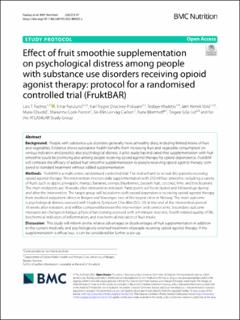| dc.contributor.author | Fadnes, Lars T. | |
| dc.contributor.author | Furulund, Einar | |
| dc.contributor.author | Druckrey-Fiskaaen, Karl Trygve | |
| dc.contributor.author | Madebo, Tesfaye | |
| dc.contributor.author | Vold, Jørn Henrik | |
| dc.contributor.author | Olsvold, Maria | |
| dc.contributor.author | Pierron, Marianne Cook | |
| dc.contributor.author | Carlsen, Siv-Elin Leirvåg | |
| dc.contributor.author | Blomhoff, Rune | |
| dc.contributor.author | Lid, Torgeir Gilje | |
| dc.date.accessioned | 2022-11-08T14:44:12Z | |
| dc.date.available | 2022-11-08T14:44:12Z | |
| dc.date.created | 2022-10-28T13:34:42Z | |
| dc.date.issued | 2022-09-03 | |
| dc.identifier.issn | 2055-0928 | |
| dc.identifier.uri | https://hdl.handle.net/11250/3030720 | |
| dc.description.abstract | Background: People with substance use disorders generally have unhealthy diets, including limited intake of fruit and vegetables. Evidence shows substantial health benefits from increasing fruit and vegetable consumption on various indicators and possibly also psychological distress. A pilot study has indicated that supplementation with fruit smoothie could be promising also among people receiving opioid agonist therapy for opioid dependence. FruktBAR will compare the efficacy of added fruit smoothie supplementation to people receiving opioid agonist therapy compared to standard treatment without added supplementation.
Methods: FruktBAR is a multicentre, randomised controlled trial. The trial will aim to recruit 302 patients receiving opioid agonist therapy. The intervention involves daily supplementation with 250 ml fruit smoothie including a variety of fruits such as apple, pineapple, mango, bananas, orange, blueberries, passion fruit, coconut, lime, and blackcurrant. The main endpoints are 16 weeks after intervention initiation. Participants will be included and followed up during and after the intervention. The target group will be patients with opioid dependence receiving opioid agonist therapy from involved outpatient clinics in Bergen and Stavanger, two of the largest cities in Norway. The main outcome is psychological distress assessed with Hopkins Symptom Checklist (SCL-10) at the end of the intervention period 16 weeks after initiation, and will be compared between the intervention and control arms. Secondary outcome measures are changes in fatigue, physical functioning assessed with a 4-minute step-test, health-related quality of life, biochemical indicators of inflammation, and biochemical indicators of fruit intake.
Discussion: This study will inform on the relative advantages or disadvantages of fruit supplementation in addition to the current medically and psychologically oriented treatment of people receiving opioid agonist therapy. If the supplementation is efficacious, it can be considered for further scale-up. | en_US |
| dc.language.iso | eng | en_US |
| dc.publisher | BMC | en_US |
| dc.rights | Navngivelse 4.0 Internasjonal | * |
| dc.rights.uri | http://creativecommons.org/licenses/by/4.0/deed.no | * |
| dc.title | Effect of fruit smoothie supplementation on psychological distress among people with substance use disorders receiving opioid agonist therapy: protocol for a randomised controlled trial (FruktBAR) | en_US |
| dc.type | Journal article | en_US |
| dc.type | Peer reviewed | en_US |
| dc.description.version | publishedVersion | en_US |
| dc.rights.holder | Copyright 2022 the authors | en_US |
| dc.source.articlenumber | 97 | en_US |
| cristin.ispublished | true | |
| cristin.fulltext | original | |
| cristin.qualitycode | 1 | |
| dc.identifier.doi | 10.1186/s40795-022-00582-z | |
| dc.identifier.cristin | 2066069 | |
| dc.source.journal | BMC Nutrition | en_US |
| dc.identifier.citation | BMC Nutrition. 2022, 8, 97. | en_US |
| dc.source.volume | 8 | en_US |

